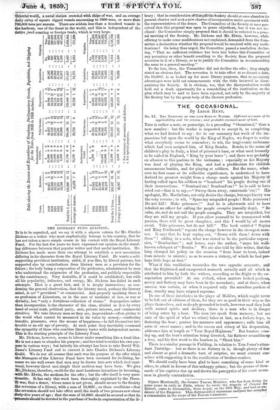THE LITERARY FUND QUESTION.
Iv is to be regretted, and we say it with a sincere esteem for Mr. Charles Dickens as a writer who most emphatically belongs to his country, that he has not taken a more simple course in his contest with the Royal Literary Fund. For the last few years we have expressed our opinion on the stand- ing difference between that popular writer and that useful institution. Mr. Dickens has made more than one attempt to establish a new assooiation differing Mita character from the Royal Literary Fund. He wants a self- supporting provident institution, aided, if you like, by liberal patrons, but supported also by contributions from literary men as a provision for the future; the body being a corporation of the profession, administered by men who understand the exigencies of the profession, and publicly responsible to the constituency. Very desirable, if it could be established; but with all his popularity, influence, and energy, Mr. Dickens has failed in such Attempts. That is a great fact, and it is deeply instructive; as con- .firming the general obsetvation, that the literary mood, perhaps the literary mind, is not " provident " or commercial. And properly speaking there is 414 profession of Literature, as in the ease of medicine or law, or war or -divinity, but " only a fortuitous collection of atoms." Segregation rather than incorporation is the character of the class, divided as it is by every -band of social rank, political party, sect, private interest, and commercial rivalries. We take literary men as they are, improvident—often giving to the world what cannot be measured in its -value by money,—conferring benefits, pleasures, even the means of happiness,—to fall themselves into trouble or an old age of poverty. At such point they inevitably command the sympathy of those who combine literary tastes with independent means. This is the starting principle of the Literary Fund. Mr. Dickens, however, seems to labour under something like a fixed idea. He is not a man to abandon his purpose; and has tried to realize his own pur- Tose in various ways; but latterly his attempt has been to take David Wil- liams's Literary Fund and to convert it into Charles Dickens's Literary -Guild. We do not all assume that such was the purpose of the offer which the Managers of the Literary Fund have been censured for declining, be- cause we are well aware that men may be drawn into acts which look equi- vocal, however direct and simple their motives may have been. We give Mr.:Dickens, therefore, credit for the most handsome intentions in becoming, with Mr. Elwin, the medium for the offer; but the offer itself is very ques- tionable. It has only this week been thoroughly explained by the Brno& It was, that a donor, whose name is not given, should secure to the Society '.the reversion of a library, with a sum of 10,000/., on these conditions—that use reversion should not take effect until the death of two persons now about eforty-five years of age; that the sum of 10,0001. should be secured so that its aProceeds should be devoted to the purchase of books in augmentation of the li- brary ; that in consideration of this gift the Society should at once abandon its present charter and seek anew charter of incorporation under agreement with the representatives of the donor. The Committee of the Society at once per- ceived that this proposal-was open to grave objections, but it was not de- clined : the Committee simply proposed that it should be referred to a gene- ral meeting of the Society. Mr. Dickens and Mr. Elwin, however, while • oftbring to make some modifications not explained, demanded from the Com- mittee a declaration whether the proposal would be received with any modi- fications ? On being thus urged, the Committee passed a resolution declar- ing, "That no sufficient evidence has been laid before this Committee of any pecuniary or other benefit resulting to the Society from the proposed accession to it of a library, so as to justify the Committee in recommending the same to a general meeting." To the last, then, the Committee did not decline the offer; they simply stated an obvious fact. The reversion is to take effect at so distant a date, the 10,000/. is so locked up for mere library purposes, that no pecuniary Advantages were held out commensurate with the risks incurred in disor- ganizing the Society. It is obvious, too, that the disorganization would hold out a fresh opportunity for a remodelling of the institution on the plan which may be said to have been rejected, not only by the majority of the Society but by the great body of the literary profession.


























 Previous page
Previous page